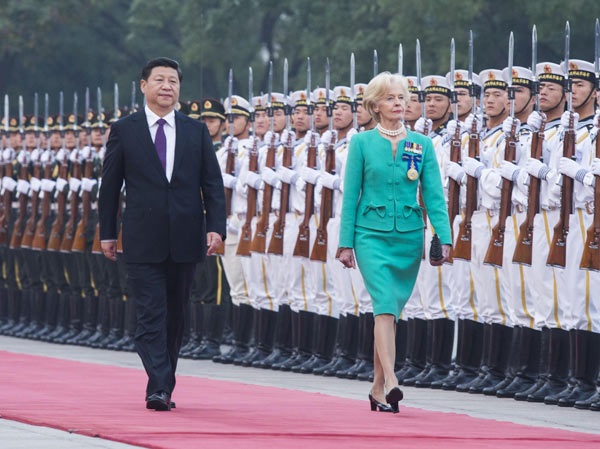

 |
|
Chinese President Xi Jinping and Australia's Governor-General Quentin Bryce (R) inspect an honour guard at a welcoming ceremony outside the Great Hall of the People in Beijing, October 17, 2103. [Photo/Xinhua] |
As he met visiting Governor-General of Australia Quentin Bryce in Beijing on Thursday, Xi said the two nations should fully explore the potential in Sino-Australian cooperation.
Xi’s comments come in the wake of Australian Prime Minister Tony Abbott’s comments earlier this month, expressing hope that a free trade agreement between the two countries could be concluded soon.
Stressing the rapid development of bilateral ties and the establishment of a strategic partnership, Xi said the common interests of the two countries continue to expand, against a backdrop of profound and complex changes in the international situation.
From a strategic and long-term perspective, Xi said the two sides should create a new phase of Sino-Australian cooperation, built on a solid basis of mutual trust, reciprocity and the win-win principle.
The two countries should develop and diversify cooperation on energy resources, infrastructure, financial services, environmental protection, clean energy, biomedicine and other emerging industries, Xi said.
After meeting with Xi, Bryce also met Premier Li Keqiang.
Noticing Australia is actively working on upgrading its infrastructure and has started a feasibility study into building its first high-speed railway, Premier Li said China’s railway technologies are "advanced, reliable and economically competitive”.
He said the two countries could explore cooperation in the railway sector.
Hua Junduo, former Chinese ambassador to Australia, said the newly elected Australian government is fairly pragmatic in its approach to developing bilateral relations with China.
"However, the two countries’ cooperation on regional issues and under multilateral mechanisms remains limited. If the two sides can enhance coordination, more common interests will be developed,” Hua added.
During their meeting, President Xi stressed that Beijing and Canberra should also strengthen exchanges on education, tourism, science and technology, and the younger generations, in order to promote mutual understanding and friendship between the two peoples.
He also emphasized coordination and cooperation under multilateral mechanisms such as the United Nations, G20, and Asia-Pacific Economic Cooperation, to contribute more to regional and global development.
Xi invited Bryce to attend the 14th Western China International Fair in Chengdu, Sichuan province, next week, adding that western China is the new engine of China’s economic growth, which will also bring more opportunities for foreign countries, including Australia.
Before the meeting, Xi greeted Bryce with a grand welcoming ceremony and a 21-gun salute outside the Great Hall of the People.
The Sino-Australian bilateral economic and trade relationship continues to expand. According to the Australian government, China is now Australia’s largest trading partner in goods and services, valued at A$125 billion ($120.3 billion) in 2012.
Last year China was both Australia’s largest export destination and its largest source of imports.
Once concluded, the Sino-Australian Free Trade Agreement is likely to reduce or remove the tariff and non-tariff barriers that affect bilateral trade, and to encourage more foreign investment between the two countries.
Bryce said China is an important partner for Australia, and Australia is a stable resource and energy supplier for China.
"Australia is willing to expand the mutually beneficial cooperation with China, to reach the free trade agreement, enhance the cooperation with west China, and promote coordination and cooperation in regional and global issues,” she said.
When Australian Prime Minister Tony Abbott met Xi in Bali earlier this month, Abbott said he hoped the free trade agreement between the two countries would be signed within a year.
"We welcome foreign investment, including foreign investment from China," he said, adding that it would be good for jobs and economic activities, AFP reported.
"It should be good for government revenues and it will certainly be good for prosperity back home in Australia," Abbott said.
In 2012, there were 150,000 Chinese students in Australia, the highest number of any nationality. Bryce said she would welcome more Chinese students in Australia.
"Australia is also encouraging our students traveling to Asia, to study, to gain experiences and expanding skills, to use and apply these skills to the benefit of Asia and Australia,” Bryce told a group of students at Renmin University of China.
Mo Jingxi contributed to the story